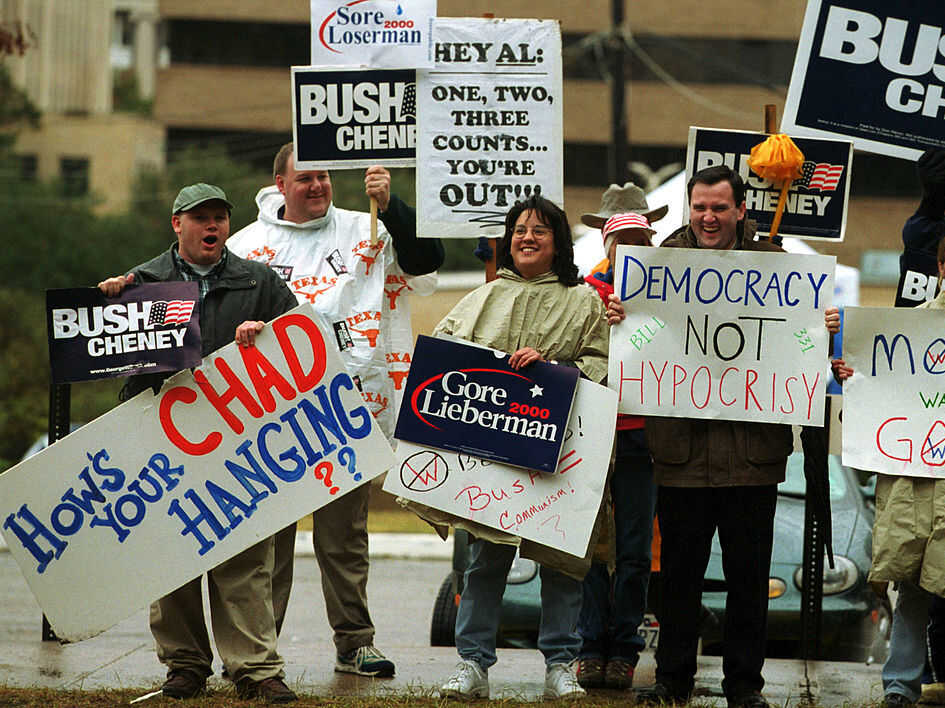
The independent state legislature theory was first invoked by three conservative US Supreme Court justices in the celebrated Bush v. Gore case that handed the 2000 election victory to George W. Bush.
Joe Raedle/Getty Images
hide caption
toggle caption
Joe Raedle/Getty Images
The independent state legislature theory was first invoked by three conservative US Supreme Court justices in the celebrated Bush v. Gore case that handed the 2000 election victory to George W. Bush.
Joe Raedle/Getty Images
The Supreme Court on Thursday agreed to hear a case that could dramatically change how federal elections are conducted. At issue is a legal theory that would give state legislatures unfettered authority to set the rules for federal elections, free of supervision by state courts and state constitutions.
The theory, known as the “independent state legislature theory,” stems from the election clause in Article I of the Constitution. It says, “The times, places and manner of holding elections for senators and representatives, shall be prescribed in each state by the legislature thereof.”
Proponents of the theory argue that that clause gives state legislatures power to regulate federal elections uninhibited by state courts or state constitutions. If a majority of the Supreme Court agrees, that would hamstring state courts, removing judicial oversight of state elections.
“Taken to its extreme, the independent state legislature doctrine could be an earthquake in American election law and fundamentally alter the balance of power within states and provide a pathway to subvert election results,” says professor Richard Hasen, an expert on election law from the University of California, Irvine.
The theory comes to the court in a case from North Carolina where the state supreme court threw out the state legislature’s drawing of new congressional district lines. The court found that the reapportionment was such an extreme partisan gerrymander that it violated the state constitution. And in reaching its decision, the court noted that the state constitution and the state legislature itself had authorized judicial review of congressional redistricting plans.
The Republican speaker of the North Carolina House of Representatives and other GOP legislators appealed to the US Supreme Court, contending that only the legislature could alter redistricting plans, not the state supreme court.
The independent state legislature theory was first invoked by three conservative US Supreme Court justices in the celebrated Bush v. Gore case that handed the 2000 election victory to George W. Bush. In that case, the three cited it to support the selection of a Republican slate of presidential electors.
In the North Carolina case, the Republican-dominated state legislature is invoking it to draw maps favorable to the GOP.
In its most extreme form, the independent state legislature theory was invoked — unsuccessfully — by Trump advocates in an effort to sidestep the legitimate outcome of the 2020 election. In Arizona, for instance, some Trump supporters used the theory in calling for the decertification of the state’s electors. Among those seeking decertification was Virginia Thomas, the wife of Justice Clarence Thomas.
Thomas is one of four conservatives on the current court who have indicated their support for the independent state legislature theory. The others are Justices Samuel Alito, Neil Gorsuch and Brett Kavanaugh. Kavanaugh worked on the legal team supporting then-Texas Gov. Bush in the aftermath of the 2000 election. Bush v. Gore, a decision often referred to as a ticket “for this train only,” was never cited in any subsequent Supreme Court decision. Until 2020, when Kavanaugh, by then a Supreme Court justice, cited it in a Wisconsin election case dealing with rules for absentee ballots at the height of the pandemic.
In a previous iteration of the North Carolina case last March, Kavanaugh said the court should at some point “carefully consider” the independent state legislature issue, “as it is almost certain to keep arising” until it is definitely resolved. Justices Alito, Thomas and Gorsuch took things a step further, declaring, “there must be some limit on the authority of state courts to countermand actions taken by state legislatures when they are prescribing rules for the conduct of federal elections.”
Just where the court will end up on this issue is not yet clear. Chief Justice John Roberts, writing for the court’s five most conservative justices in 2019, said one of the checks on partisan gerrymandering is that state courts can continue to oversee congressional redistricting plans.
In another relevant case, the court in 2015 upheld the right of Arizona voters to try to make the redistricting process less partisan by creating an independent redistricting commission to draw congressional district lines.
“The animating principle of our constitution is that the people themselves are the originating source of all the powers of government,” wrote Justice Ruth Bader Ginsburg for the majority. “Nothing in [the election clause] instructs, nor has this court ever held” that in the name of regulating “the time place and manner of elections” a legislature may enact laws “in defiance of provisions of the state’s constitution.”
That idea is supported by a new scholarship that suggests that the public understanding of the term “legislature” at the founding was not what it is today. At the founding, the accepted meaning of the word “legislature” was a body created and constrained by state constitutions, according to an article to be published in The Supreme Court Review. The authors are Vikram Amar, dean of the University of Illinois law school, and his brother, Yale law professor Akhil Amar.
You can be sure that theirs will not be the last word.
this case, Moore v. Harperwill likely be argued this fall after the midterm elections.